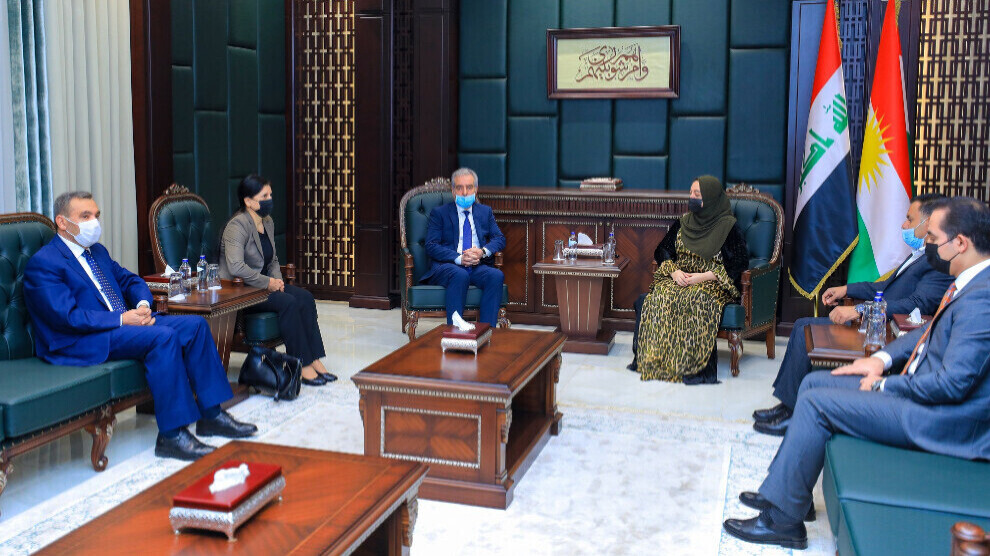2020: A year of Kurdish diplomacy and public relations
In mid-March, many European countries went into lockdown due to the coronavirus pandemic. The Kurdish movement therefore only held many events online.
In mid-March, many European countries went into lockdown due to the coronavirus pandemic. The Kurdish movement therefore only held many events online.

Despite the pandemic the Kurdish movement continued its diplomatic and public relations work throughout the year without interruption. The focus of the work was the inter-Kurdish dialogue and the campaign for freedom of the Kurdish pioneer Abdullah Öcalan.
Kurdish conference in the European Parliament
From 5 to 6 February the 16th conference “The European Union, Turkey, the Middle East and the Kurds” took place in the European Parliament in Brussels. Numerous MEPs and guests from all over the world spent two days discussing the Kurdish question and its international effects.
The impetus for this conference, which has been taking place annually since 2004, was the military conflict between the Turkish state and the Kurdish freedom movement in Northern Kurdistan and Turkey. The aim is to offer a forum from which the impetus for a political and diplomatic solution to the Kurdish question can come.
This year’s conference mainly dealt with the human rights situation in Turkey, the isolation of the Kurdish pioneer Abdullah Öcalan, the crisis in the Middle East, the occupation of northern Syria and the Kurdish factor in geopolitics in the Middle East as well as the Kurds' prospects for a democratic solution.
In their final declaration, the conference participants called for a new discourse in dealing with relations with Turkey and the Middle East in general. It was underlined that the Kurds are "an important actor for stability, consolidation of peace, democracy, ecology and gender equality" in the region. The Kurds' regional alliances and global perspectives offer new approaches for stabilizing a region affected by wars and crises. "For this reason, strengthening cooperation with these democratic forces should be an absolute priority," said the final declaration. The participants made specific demands to the member states of the European Union, their institutions and the United Nations.
PKK judgment upheld in Belgium
On 28 February, the Court of Cassation in Brussels confirmed the decision of the Belgian Court of Appeal of March 2019 that the Kurdish Workers' Party PKK is not a “terrorist organization”, but a party in an armed conflict. Two weeks earlier, the Attorney General at the Brussels Court of Cassation had already made a corresponding recommendation. The decision is final and binding on all parties.
Murder of Olaf Palme: Kurds demand apology
34 years after the murder of the Swedish Prime Minister Olaf Palme, the Swedish authorities said thet had identified the alleged perpetrator in June 2020. It has been proven that graphic designer Stig Engström shot Palme in 1986, said prosecutor Krister Petersson in Stockholm. The theory of a “lone wolf” was presented. The head of the investigation, Hans Holmér, had been obsessed with the idea that the PKK might have been behind the Palme murder. There were police attacks on dozens of Kurdish activists. Although there were no progress in the investigation, the anti-Kurdish propaganda machine in the Swedish, German and Turkish media was already running. The PKK and Abdullah Öcalan persistently denied any involvement in the Palme murder. After the termination of the proceedings, the PKK demanded an apology and declared: "The Kurdish people and the PKK were not only accused of murder: on the basis of the assassination attempt on Olof Palme, hostility between the peoples was stoked and the Kurdish people were done injustice and disrespect."
Diplomatic initiatives of the KNK
The National Congress of Kurdistan (KNK) launched numerous initiatives this year to strengthen inter-Kurdish dialogue. This engagement was particularly important given the continuing danger of civil war in South Kurdistan, which was triggered by the stationing of the Kurdistan Democratic Party (KDP) in guerrilla areas. A delegation from the KNK held talks with numerous parties and institutions in order to avert this danger.
In October an online general assembly of the KNK took place with broad participation. In November the KNK held a symposium for an inter-Kurdish dialogue together with South Kurdish delegates. Kurdish representatives from all parts of the country as well as from the Caucasus and Anatolia took part in the online event.
Freedom for Öcalan
A special focus in Kurdish public relations was the international campaign “Freedom for Öcalan”.
The British trade unions Unite the Union and GMB, which together have over two million members, are continuing their Öcalan campaign.
Internationalist long march
This year, too, a long march to Strasbourg took place in February on the anniversary of Abdullah Öcalan's kidnapping. Under the slogan "Freedom for Öcalan, shoulder to shoulder against fascism", 120 internationalists from dozens of countries took part in the demonstration that started in Luxembourg.
Öcalan's works in German and French
In April the German translation of “Sociology of Freedom”, the third volume of Öcalan's Manifesto of Democratic Civilization, was published by Unrast Verlag. The translator Reimar Heider presented the work at events in numerous cities.
In France, the translation of the first volume of Öcalan's Manifesto was published by Croquant Verlag in October. The translation team is currently working on the second volume.